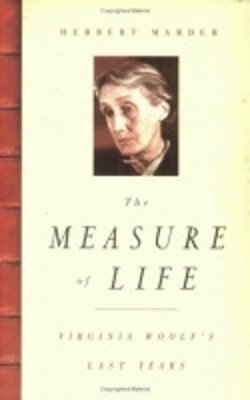
The Measure of Life. Virginia Woolf's Last Years.
Herbert Marder
This elegantly written and richly detailed biography tells the story of Virginia Woolf's last ten years, from the creation of her great visionary novel, The Waves, to her suicide in 1941. Herbert Marder looks closely at Woolf's views on totalitarianism and her depictions of Britain under siege to create a remarkable portrait of a mature and renowned writer during a time of rising fascist violence.
An awareness of personal danger, Marder says, colored Woolf's actions and consciousness in the years leading up to World War II. She practiced her art with intense dedication and was much admired for her wit and vivacity. But she had previously tried to kill herself, and she asserted her right to die if her manic-depressive illness became intolerable. Waves and water haunted her imagination; visions of drowning recurred in her work.
The Measure of Life suggests that Woolf anticipated her suicide, and indeed enacted it symbolically many times before the event. Marder's account of her death emphasizes the importance of her relationship with her doctor and distant cousin, Octavia Wilberforce. Wilberforce's letters about Woolf's last months, including some previously unpublished passages, appear in the appendix.
Staying close to the spirit of Woolf's own writing, Marder traces her evolving social consciousness in the 1930s, connecting her growing concern with politics and social history with the facts of her daily life. He stresses her endurance as a working writer, and explores her friendships, her complex relations with servants, and her activities at the Hogarth Press. The Measure of Life illuminates the unspoken quarrels and obscure acts of courage that provide a key, as Woolf herself believed, to the hidden roots of our existence. By letting the reader see events as Virginia Woolf saw them, Marder's compelling narrative captures both her unique comic spirit and her profound seriousness.
Product Details
About Herbert Marder
Reviews for The Measure of Life. Virginia Woolf's Last Years.
Library Journal
A biography of the last decade of Virginia Woolf's life that generously grants the reader an intimate view of her extraordinary world.... it is a tribute to his skills as a writer and to Woolf's life as an artist that his resulting work sings her praises clearly while not flinching from her failures.... Marder creates a breathing and multi-layered vision of a genius at work. The story ends, as it must, with Woolf's suicide in the river; the bleak ending feels not as harsh as it might because Marder has given the reader a real sense of the woman and the causes for her untimely death. A biography for those who love Woolf and for those who want to love her all the more by knowing her all the better.
Kirkus Reviews
Marder... offers a supple narrative, a steady serving of biographical observation, the best of which focuses on Woolf's long-term fascination with drowning and death. In Marder's sensitive account, Woolf's suicide is not the unexplainable tragedy of madness, but rather the measured end of a narrative, as inevitable as it is unhappy.
Taylor Antrim
The New York Times Book Review
Marder's approach... allows the reader to see Woolf's genius, her failures and her passions, as the complex, variegated days of a life. Woolf comes off as a hard-working writer who never rested on her popularity and praise. In this book Marder moves the last ten years of her life out from under the shadow of her suicide, and respectfully and lovingly puts this productive time into context. Household chatter, visits to the doctor, quibbles with servants, and blossoming friendships may not change Virginia Woolf's literary output or her influence; they do, however, make a good story of artistic struggle, a story worthy of its many retellings.
Carolyn Kuebler
Rain Taxi Review of Books
The book reflects the author's keen understanding of Woolf as an emotionally and socially conflicted woman whose art flourishes even as her life and work during this time are haunted with the possibility of suicide.... This is literary biography at its best.
Choice
The Measure of Life reflects its subject in being fully alive to complex interactions: Marder examines in detail Woolf's relationships with a range of figures, from her cook Nelly Boxall... to the composer Ethel Smyth, and to Octavia Wilberforce, who became her doctor in the final months of her life.... He reads people, novels and events with sensitivity and generosity.
Julia Briggs
Times Literary Supplement
